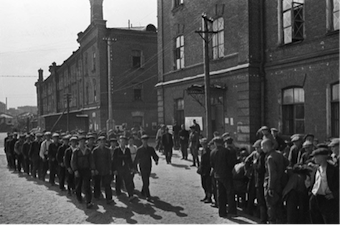

|
Stalin's response to the German Invasion  Volunteers for the Soviet Army, Moscow 1941 Stalin's absence from the public scene added to this feeling of uncertainty. He seems to have suffered some sort of breakdown in the first days of the war. It was not until 1 July that Stalin returned to the Kremlin and, only two days later, that he made his first war speech to the country. He addressed the people as 'brothers, sisters, friends' and called on them to unite in this 'war of the entire Soviet people.' Millions of people volunteered to fight. People's Militias were formed in towns. But not everyone responded positively to Stalin's call. The outbreak of war witnessed an explosion of open talk and criticism of the Soviet regime. Many people criticized the lack of preparation for the war, the stringent labour discipline, the cut in rations, forced conscriptions, and the flight of many factory and Party bosses to the rear. Some even welcomed the prospect of a German victory. It was a commonplace that only Jews and Communists had anything to fear from the Germans. On 20 July, Stalin took control of the military command. Like the Tsar in the First World War, he was gambling all his power on his ability to save the nation from catastrophe. Stalin ordered a counter-offensive on the Moscow front. For a while the German advance slowed, not least because part of the invading force was diverted to the south to seize the rich agricultural land, industries and coal-mines of Ukraine. The Germans captured Kiev on 9 September. |
© 2014 Orlando Figes | All Rights Reserved